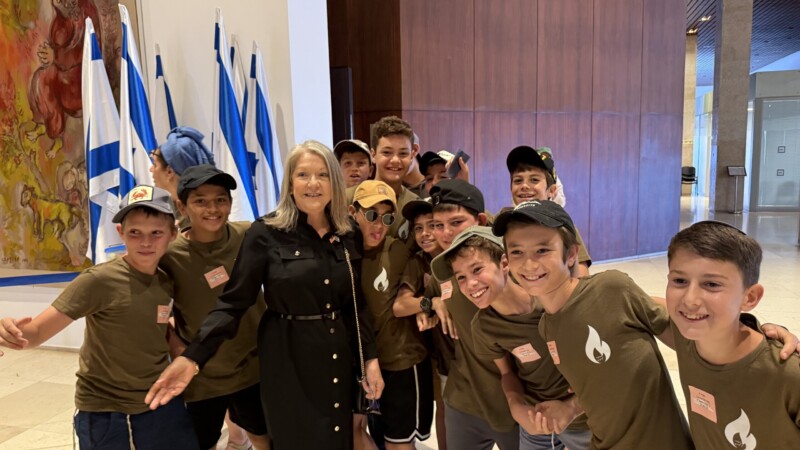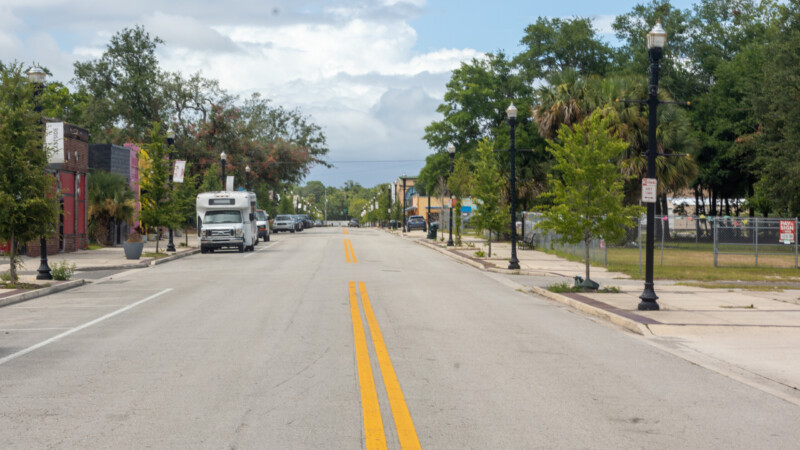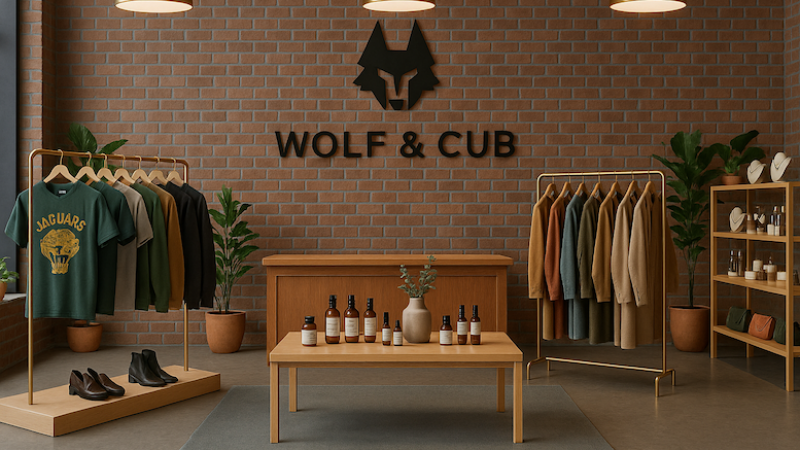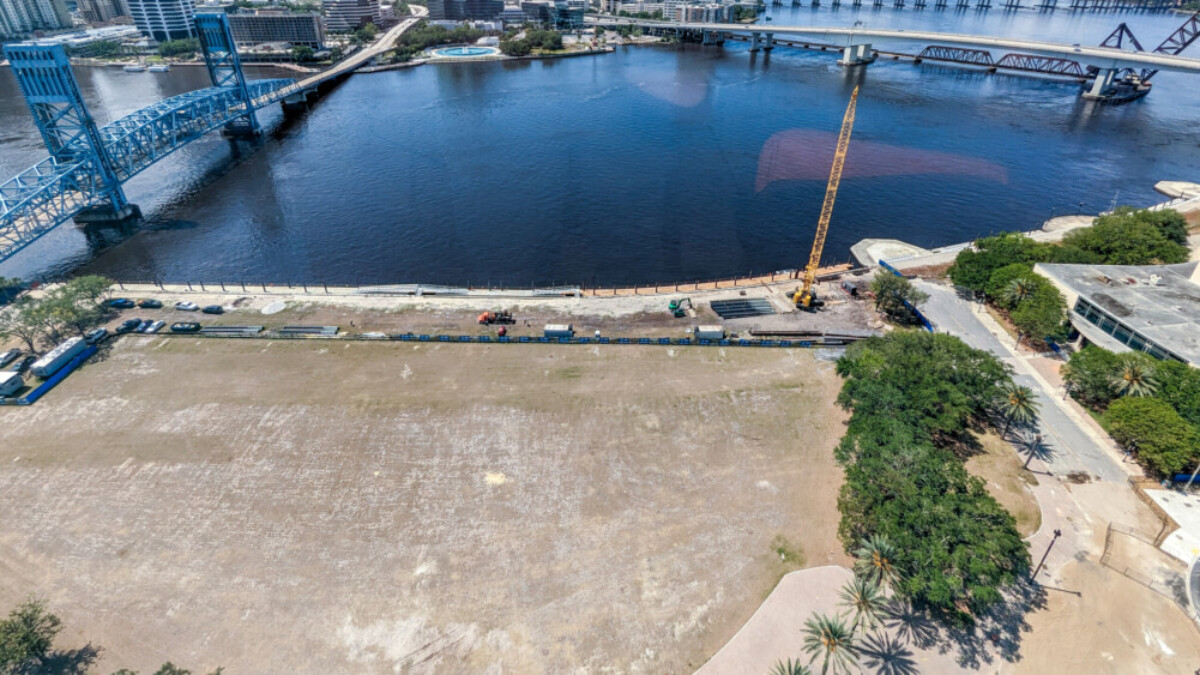Author Jeff Goodell will speak Saturday at 2 p.m. at Jacksonville’s main library downtown, an event sponsored by Jacksonville St. Johns Riverkeeper, Jacksonville Climate Coalition, and Jacksonville Public Library.
Hope to see you there.
In his recently published The Heat Will Kill You First, Jeff Goodell tells the story about a young California family who take a hike on a Sunday morning in August 2021. The temperature is in the mid-70s with low humidity when dad Jonny, mom Ellen, 1-year-old daughter Miju, and their 8-year-old dog Oski head out around 7:30. The recorded air temperature rises to a dangerous 107 degrees by noon. But that temperature, Goodell explains, is just the air temperature. The temperature the family experienced was “much higher” given the “full sun and no shade and rocks absorbing and amplifying the heat.”
Jonny’s body is found sitting up, as if he simply couldn’t take another step and sat down to rest, with his daughter and dog beside him. Mom is found a few feet away, doing what you would expect: trying, Goodell speculates, to find an escape route. Hyperthermia — the condition in which human body temperature reaches dangerous levels causing internal cell structures to melt — killed them.
“Extreme heat,” writes Goodell, “penetrates every living cell and melts them like a Popsicle on a summer sidewalk.”
At once sad, gripping, and harrowing, Goodell’s telling resonates because I’m sure you and I can see ourselves as this story’s day hikers, out for a fun family outdoor walk.
We’re breaking heat records locally, regionally, nationally, and globally. According to Goodell, “the last time the Earth was hotter than it is today was 125,000 years ago, longer before anything that resembled human civilization appeared” with “the eight years between 2015 and 2022 . . . the hottest on record.”
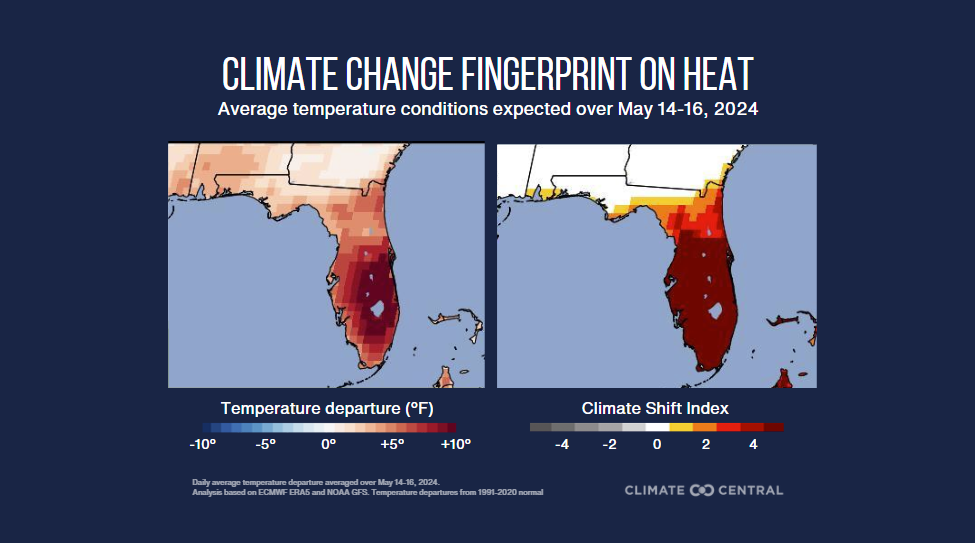
Shade Trees
Calling heat “the engine of planetary chaos,” Goodell makes a big deal about trees, especially urban shade trees. Cities are filled with concrete, asphalt, steel, automobile exhaust, and air conditioning, all of which hold, create and emit heat. Basically, urban areas are furnace factories, or “heat islands.”
We know that shade trees play a major role in cooling hot urban spaces, significantly reducing ground-level temperature. “During the summer of 2022,” writes Goodell, “the temperature on the ground in front of the Paris Opera House measured 133 degrees. A few steps away, under the shade of the trees on Boulevard des Italiens, the temperature on the sidewalk was only 82 degrees.”
A Downtown city sidewalk, when shaded by a tree—which not only blocks out the sun’s heat rays, but emits cooling moisture as well—can measure a whopping 20-to-45 degrees cooler than an unshaded sidewalk, an EPA study found.
That’s something to think about.
And apparently Donna Deegan is thinking about it.
Enter Donna Deegan: “We must prepare ourselves for extreme heat”
In arguing for extreme heat preparation during her first budget address, Mayor Deegan declared that her administration “will work to quickly utilize the unallocated $20 million that separately remains in the Tree Replacement Trust Fund.” There’s no reason, said the mayor, that we should have “neighborhoods that are 10-15 degrees warmer than the rest of the city on hot summer days.”
That’s good news indeed.
The need is beyond urgent, as it takes a shade tree years to mature. Every delay is harmful.
Jacksonville’s Urban Forestry Mapping Tool
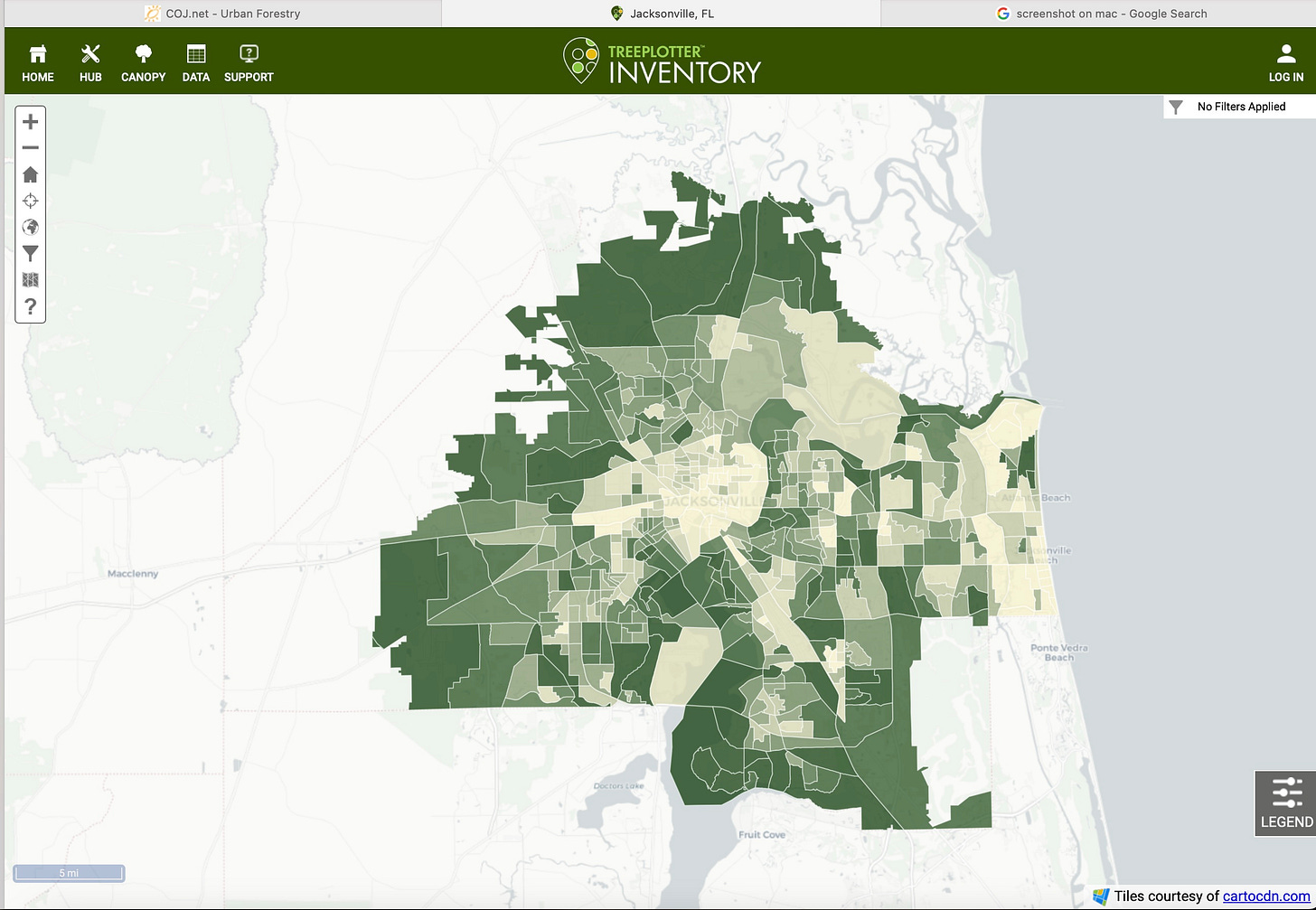
The city of Jacksonville website includes this neat urban forestry mapping tool, which allows users to understand by census tract Jacksonville’s tree canopy, where existing trees live and new trees are being planted, and how you might get involved.
Do yourself a favor and play around with the tool. A glance at the map above confirms what we would expect—Jacksonville’s urban core and poorer neighborhoods boast the fewest number of trees.
This Heat Watch Study for Jacksonville also shows the importance of shade trees.
Crime and literacy
As Goodell tells it, researchers also know that “heat lowers children’s test scores,” “raises the risk of miscarriage,” increases suicide, gun violence, rapes, and violent crime.
So in addition to the benefits outlined in Deegan’s address—”planting shade trees will beautify our neighborhoods, reduce temperature, lower our energy bills, and provide root systems that soak up water during storms”—over time, cooler, shadier neighborhoods might lower crime and boost child literacy rates.
Now that’s something for the sheriff’s department and city government to think about, given the thin tree canopy covering our most stressed neighborhoods.
What to do?
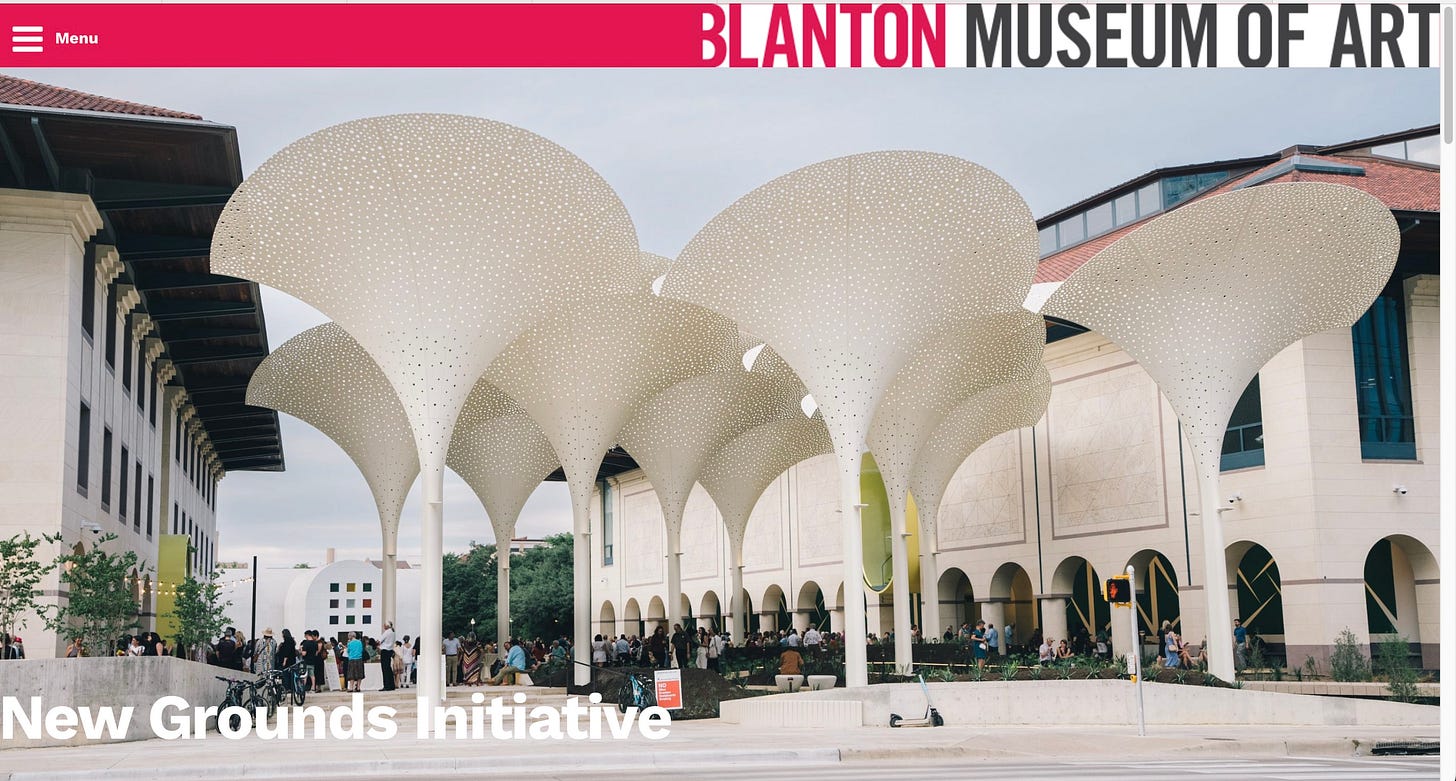
Goodell argues that cities need to develop and redevelop in “heat-smart” ways. They urgently need “more green space, more trees, more water, more shade, more thermally intelligent urban design.” “How,” in other words asks Goodell, “do you banish concrete and invite in nature?”
Cities around the world, he claims, are experimenting. They’re painting streets and building roofs white to reflect sunlight, installing “green roofs,” and planting shade trees. New York City alone has planted “over a million trees to add shade and clean the air” and is planting more. Even small museums are doing their part. Goodell’s wife directs the Blanton Museum of Art in Austin, Texas, where she “transformed a useless plaza . . . into a public gathering space shaded by 40-foot-tall carbon fiber sculptures that rise like giant elegant flowers, creating a shaded microclimate with dappled light” (Goodell, p. 220). Imagine that. Outdoor sculptures designed to create shade. Now that’s something to think about as we search for an appropriate sculpture for our newly imagined Riverfront Plaza, formerly the site of the Landing.
All of which made me wonder, as we break heat records at home, what are we thinking?
Resiliency planning
Formed in January 2020, a City Council Special Committee on Resiliency published its final report in March 2021 and called for appointing a Chief Resilience Officer charged with leading “a comprehensive effort to craft Jacksonville’s resiliency strategy.” A director was appointed in July 2021, and as Mayor Deegan mentioned during her budget address, flood, heat, and vulnerability studies quickly got underway.
More good news.
What can you do?
Pay attention to the shade tree canopy in your neighborhood and in Jacksonville’s most stressed neighborhoods including the urban core. Are these trees well cared for, especially those living on the property we own together and hold in common? As they mature and die or suffer damage, what’s replacing them? Is the canopy thinning out? Is summer shade expanding or shrinking?
Given the Deegan administration’s embracing resiliency, especially the role of shade trees in cooling our neighborhoods, email your City Council representative and encourage him or her to be involved in preparing our neighborhoods for extreme heat and to pay careful attention to the lack of shade in the urban core.
Urban shade trees should be the priority, not an afterthought.
Sources:
- https://www.coj.net/city-council.aspx
- http://apps2.coj.net/City_Council_Public_Notices_Repository/Final%20Report%20-%20Special%20Committee%20on%20Resiliency.pdf
- https://www.resilientjacksonville.com
- https://www.epa.gov/heatislands/using-trees-and-vegetation-reduce-heat-islandsSubscribe
This column appears in partnership with the JaxLookout, where a version of it first appeared in July 2023.


